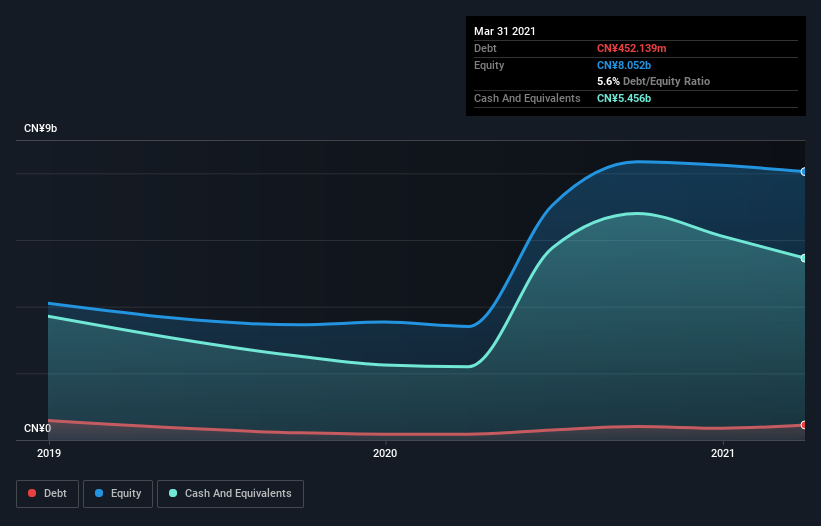Rock star Growth Puts Kingsoft Cloud Holdings (NASDAQ:KC) In A Position To Use Debt
Some say volatility, rather than debt, is the best way to think about risk as an investor, but Warren Buffett famously said that 'Volatility is far from synonymous with risk.' It's only natural to consider a company's balance sheet when you examine how risky it is, since debt is often involved when a business collapses. We can see that Kingsoft Cloud Holdings Limited (NASDAQ:KC) does use debt in its business. But the real question is whether this debt is making the company risky.
When Is Debt Dangerous?
Debt is a tool to help businesses grow, but if a business is incapable of paying off its lenders, then it exists at their mercy. In the worst case scenario, a company can go bankrupt if it cannot pay its creditors. However, a more common (but still painful) scenario is that it has to raise new equity capital at a low price, thus permanently diluting shareholders. Having said that, the most common situation is where a company manages its debt reasonably well - and to its own advantage. The first thing to do when considering how much debt a business uses is to look at its cash and debt together.
See our latest analysis for Kingsoft Cloud Holdings
What Is Kingsoft Cloud Holdings's Net Debt?
The image below, which you can click on for greater detail, shows that at March 2021 Kingsoft Cloud Holdings had debt of CN¥452.1m, up from CN¥174.4m in one year. But it also has CN¥5.46b in cash to offset that, meaning it has CN¥5.00b net cash.
How Strong Is Kingsoft Cloud Holdings' Balance Sheet?
We can see from the most recent balance sheet that Kingsoft Cloud Holdings had liabilities of CN¥3.57b falling due within a year, and liabilities of CN¥237.6m due beyond that. On the other hand, it had cash of CN¥5.46b and CN¥2.95b worth of receivables due within a year. So it actually has CN¥4.60b more liquid assets than total liabilities.
This short term liquidity is a sign that Kingsoft Cloud Holdings could probably pay off its debt with ease, as its balance sheet is far from stretched. Succinctly put, Kingsoft Cloud Holdings boasts net cash, so it's fair to say it does not have a heavy debt load! There's no doubt that we learn most about debt from the balance sheet. But it is future earnings, more than anything, that will determine Kingsoft Cloud Holdings's ability to maintain a healthy balance sheet going forward. So if you're focused on the future you can check out this free report showing analyst profit forecasts.
In the last year Kingsoft Cloud Holdings wasn't profitable at an EBIT level, but managed to grow its revenue by 56%, to CN¥7.0b. Shareholders probably have their fingers crossed that it can grow its way to profits.
So How Risky Is Kingsoft Cloud Holdings?
We have no doubt that loss making companies are, in general, riskier than profitable ones. And the fact is that over the last twelve months Kingsoft Cloud Holdings lost money at the earnings before interest and tax (EBIT) line. Indeed, in that time it burnt through CN¥2.5b of cash and made a loss of CN¥1.0b. But at least it has CN¥5.00b on the balance sheet to spend on growth, near-term. With very solid revenue growth in the last year, Kingsoft Cloud Holdings may be on a path to profitability. By investing before those profits, shareholders take on more risk in the hope of bigger rewards. When analysing debt levels, the balance sheet is the obvious place to start. However, not all investment risk resides within the balance sheet - far from it. Be aware that Kingsoft Cloud Holdings is showing 2 warning signs in our investment analysis , and 1 of those is potentially serious...
When all is said and done, sometimes its easier to focus on companies that don't even need debt. Readers can access a list of growth stocks with zero net debt 100% free, right now.
This article by Simply Wall St is general in nature. We provide commentary based on historical data and analyst forecasts only using an unbiased methodology and our articles are not intended to be financial advice. It does not constitute a recommendation to buy or sell any stock, and does not take account of your objectives, or your financial situation. We aim to bring you long-term focused analysis driven by fundamental data. Note that our analysis may not factor in the latest price-sensitive company announcements or qualitative material. Simply Wall St has no position in any stocks mentioned.
Have feedback on this article? Concerned about the content? Get in touch with us directly. Alternatively, email editorial-team (at) simplywallst.com.

 Yahoo Movies
Yahoo Movies 

